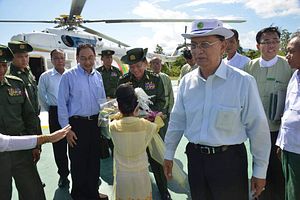Myanmar’s military marked its annual Armed Forces Day parade Sunday with a powerful display of its might days before a new opposition-led civilian government is set to take power following a historic election victory last November (See: “Myanmar’s Opposition Clinches Majority in Historic Election Win”).
The event, held near the capital Naypyidaw and featuring troops marching in formation as well as tanks and fighter jets, is meant to commemorate the beginning of Myanmar’s armed resistance against Japanese occupation in World War II. But with Myanmar’s first civilian-led government in a half-century set to assume control on April1, it was also another reminder of the power of the country’s military – also known as the Tatmadaw.
In a speech at the parade, Myanmar’s military chief Min Aung Hlaing said that the Tatmadaw would continue to “play a leading role in national politics,” safeguarding the country’s stability and sovereignty. Under the country’s military-drafted 2008 constitution, the military still wields considerable influence in the country including through its control of three key ministries – home, defense and border affairs – along with 25 percent of the seats in the legislature.
And even as some continue to hope for a transition to democracy under the opposition National League for Democracy (NLD) led by Nobel Laureate and democracy icon Aung San Suu Kyi, Min Aung Hlaing warned that Myanmar could descend into “disorderly democracy” if rule of law and stability are not preserved. His reference to rule of law were seen as a reference to Suu Kyi’s failed bid to reform the constitution, which bars her from assuming the presidency (See: “Who Will Be Myanmar’s Next President?”). Though Suu Kyi’s close aide U Htin Kyaw will be president under the new government, she has said she will remain “above the presidency” and is expected to be part of the cabinet (See: “Myanmar’s Suu Kyi to be Minister in New Opposition Government”).
“The two main obstructions in our country’s progress toward democracy are weakness in obeying rules, regulations and laws and having armed insurgents. This could lead to disorderly democracy,” he warned.
His remarks echoed his comments in an interview with Channel NewsAsia last January, where he said that Myanmar was “still a young democracy which continued to need a strong military role.” (See: “Young Myanmar Still Needs Strong Military Role, Says Military Chief”).
But he also did say in his speech that the military would continue to work with the incoming NLD government, the parliament and the public to work for the interests of the nation and its citizens.
As I have noted previously, Min Aung Hlaing had also refused to rule out his own presidential bid in the future, which would have its own implications for Myanmar.
“About becoming president, I will decide, depending on the situation of the times. If I turn my attention to (politics) now, it is likely to weaken the job I’m doing. Right now it is too early to make a decision and talk about it,” he said during that Channel NewsAsia interview.

































